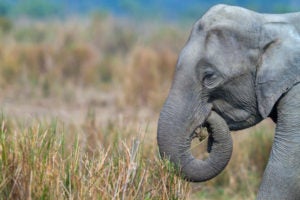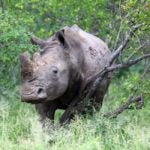
Gandhinagar — Representatives from more than 130 nations agreed to vital protections for migratory wild species at what’s being hailed as a landmark wildlife convention in Gandhinagar, India. Delegates agreed to increased or first-time conservation protection status for the endangered Mainland Asian elephant, the critically endangered great Indian bustard and Bengal florican, the jaguar, the oceanic whitetip shark, smooth hammerhead and tope shark. The circumstances of all of these species, require multi-nation conservation co-operation because their ranges traverse country boundaries.
Sixty percent of Mainland Asian elephants are found in India, and the species has been listed as Endangered in the International Union for Conservation of Nature (IUCN) since 1986, a victim of habitat loss and increasing human/elephant conflict. The great Indian bustard, whose population has dwindled to around 150 individuals in India, is persecuted by hunting in Pakistan, and the Bengal florican has a population of less than 1000 birds, struggling to survive amidst habitat loss in India and Nepal.
Mark Simmonds OBE, senior marine scientist at Humane Society International, said: “With estimates of up to one million species at risk of extinction right now, nations have a shared responsibility to act, especially in the case of migratory species. Species such as the Asian elephant and hammerhead shark are in desperate need of attention and cooperation from the countries through which they roam, mate, give birth or feed. This truly is proving to be a landmark wildlife convention because we’ve successfully secured increased conservation protection status for many species and we can now set to work on concrete measures to protect them and their habitats.
The Asian elephant is endangered throughout much of its range, trying to survive in continually shrinking, degraded and fragmented habitat, and increasingly coming into conflict with people. Its protection will be vastly improved if range countries work together to tackle these challenges, and inclusion in CMS Appendix I will significantly aid that.”
Rebecca Regnery, Humane Society International’s deputy director of wildlife, said: “The jaguar, the largest native cat of the Americas, is now absent from more than 77% of its historic range in Central America. Despite protection in all its range states, the jaguar is threatened by illegal killing and trade. Listing on CMS will formalize range state collaboration on conservation efforts, creating an international legal framework for the first time. This will provide increased incentives and funding opportunities for this work, which is critical for curbing habitat destruction, maintaining key migration corridors and reducing violence and human deaths associated with retaliation and trafficking.”
Lawrence Chlebeck, marine biologist with HSI Australia, said, “This is a fantastic success for international shark conservation efforts. Three of the shark species hardest hit by commercial fishing will, from today, receive brand new international attention and coordination. Sharks are especially susceptible to population decline due to late maturation and low reproductive potential, and they are therefore some of the most threatened animals on our planet. International, cooperative conservation measures, such as those that will result from these listings, are absolutely vital to the ecological viability and survival of these species.”
Summary of key decisions today at CMS CoP 13
- Mainland Asian elephant/Indian elephant (Elephas maximus indicus) added to Appendix I
- Great Indian bustard and Bengal florican added to Appendix I
- The jaguar (Panthera onca) added to Appendices I and II
- The antipodean albatross (Diomedea antipodensis) added to Appendix I
- Oceanic whitetip shark (Carcharhinus longimanus) added in Appendix I
- Smooth hammerhead shark (Sphyrna zygaena) added to Appendix II
- Tope shark (Galeorhinus galeus) added to Appendix II.
These decisions have been made in the convention’s ‘Meeting in the Whole’ and are subject to formal verification in the closing plenary of the CoP on 22nd February. However, as they have been agreed by consensus, this is now a formality.
ENDS
Media contact: Wendy Higgins whiggins@hsi.org












